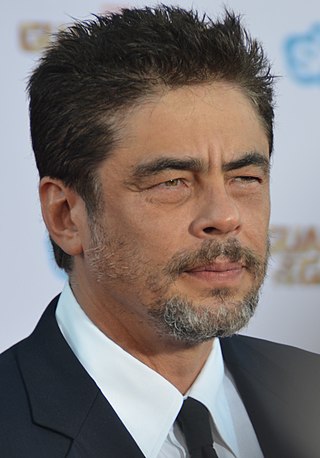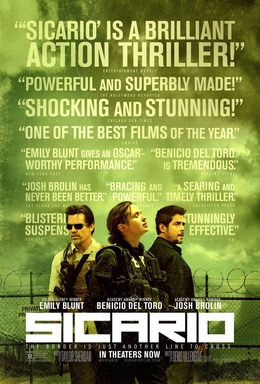
Traffic is a 2000 American crime drama film directed by Steven Soderbergh and written by Stephen Gaghan. It explores the illegal drug trade from several perspectives: users, enforcers, politicians, and traffickers. Their stories are edited together throughout the film, although some characters do not meet each other. The film is an adaptation of the 1989 British Channel 4 television series Traffik. The film stars an international ensemble cast, including Don Cheadle, Benicio del Toro, Michael Douglas, Erika Christensen, Luis Guzmán, Dennis Quaid, Catherine Zeta-Jones, Jacob Vargas, Tomas Milian, Topher Grace, James Brolin, Steven Bauer, and Benjamin Bratt. It features both English and Spanish-language dialogue.

Benicio Monserrate Rafael del Toro Sánchez is a Puerto Rican actor. He has garnered critical acclaim and numerous accolades, including an Academy Award, a BAFTA Award, a Golden Globe, and a Silver Bear for his portrayal of the jaded but morally upright police officer Javier Rodriguez in the film Traffic (2000). Del Toro's performance as despairing ex-con turned zealot Jack Jordan, in Alejandro González Iñárritu's 21 Grams (2003), earned him a second nomination for the Academy Award for Best Supporting Actor.

Steven Bauer is an American actor.
United States v. Verdugo-Urquidez, 494 U.S. 259 (1990), was a United States Supreme Court decision that determined that Fourth Amendment protections do not apply to searches and seizures by United States agents of property owned by a nonresident alien in a foreign country.
Juan Ramón Matta-Ballesteros is a Honduran former major narcotics trafficker who has been credited with being one of the first to connect Mexican drug traffickers with the Colombian cocaine cartels. This connection paved the way for a major increase in the amount of cocaine smuggled into the United States during the late 1970s and throughout the 1980s. Matta was indicted for operating several major cocaine smuggling rings in United States in the early 1980s. He was also one of the narcotics traffickers accused of the kidnap and murder of American DEA agent Enrique Camarena in 1985.

Miguel Ángel Félix Gallardo, commonly referred to by his aliases El Jefe de Jefes and El Padrino, is a convicted Mexican drug kingpin who was one of the founders of the Guadalajara Cartel, which controlled much of the drug trafficking in Mexico and the corridors along the Mexico–United States border in the 1980s.
The Guadalajara Cartel, also known as The Federation, was a Mexican drug cartel which was formed in the late 1970s by Miguel Ángel Félix Gallardo, Rafael Caro Quintero, and Ernesto Fonseca Carrillo in order to ship cocaine and marijuana to the United States. Among the first of the Mexican drug trafficking groups to work with the Colombian cocaine mafias, the Guadalajara Cartel prospered from the cocaine trade. Throughout the 1980s, the cartel controlled much of the drug trafficking in Mexico and the corridors along the Mexico–United States border. It had operations in various regions in Mexico which included the states of Jalisco, Baja California, Colima, Sonora, Chihuahua and Sinaloa among others. Multiple modern present day drug cartels such as the Tijuana, Juárez and Sinaloa cartels originally started out as branches or "plazas" of the Guadalajara Cartel before its eventual disintegration.

Rafael "Rafa" Caro Quintero is a Mexican drug lord who co-founded the now-disintegrated Guadalajara Cartel with Miguel Ángel Félix Gallardo and other drug traffickers in the late 1970s. He is the brother of fellow drug trafficker Miguel Caro Quintero, founder and former leader of the defunct Sonora Cartel.
Javier Barba-Hernández was a Mexican lawyer turned enforcer, hired by the Guadalajara Cartel to combat the Mexican Federal Judicial Police (FJP) and the American Drug Enforcement Administration (DEA).
Ernesto Fonseca Carrillo, commonly referred to by his alias Don Neto, is a Mexican drug lord and former leader of the Guadalajara Cartel, a defunct criminal group based in Jalisco. He headed the organization alongside Miguel Ángel Félix Gallardo, and Rafael Caro Quintero. Fonseca Carrillo was involved with drug trafficking since the early 1970s, primarily in Ecuador, and later moved his operations to Mexico.

Juan José Esparragoza Moreno, commonly referred to by his alias El Azul, was a Mexican drug lord and co-founder of the Sinaloa Cartel, a drug trafficking organization. Originally a member of the Dirección Federal de Seguridad (DFS) police agency, he founded the Guadalajara Cartel in the 1970s along with other drug kingpins in Mexico. Following its disintegration in the late 1980s, he went on to lead the Juárez Cartel and eventually settled in the Sinaloa Cartel. He worked alongside Joaquín "El Chapo" Guzmán, once considered Mexico's most-wanted, drug lord.
The Sonora Cartel, also known as Caro Quintero Organization, was a Mexico based criminal cartel. Upon the cartel's disintegration, its leaders were incorporated into the Tijuana Cartel and Sinaloa Cartel.
Miguel Ángel Caro Quintero is a Mexican convicted drug lord and former leader of the Sonora Cartel, a defunct criminal group based in Sonora.

The Dirección Federal de Seguridad was a Mexican intelligence agency and secret police. It was created in 1947 under Mexican president Miguel Alemán Valdés with the assistance of U.S. intelligence agencies as part of the Truman Doctrine of Soviet Containment, with the duty of preserving the internal stability of Mexico against all forms of subversion and terrorist threats. It was merged into the Centro de Investigación y Seguridad Nacional (CISEN) in 1985.

Enrique "Kiki" Camarena Salazar was a Mexican-American intelligence officer for the Drug Enforcement Administration (DEA). In February 1985, Camarena was kidnapped by corrupt police officers hired by the Guadalajara Cartel. He was interrogated under torture and murdered. Three leaders of the cartel were eventually convicted in Mexico for Camarena's murder. The U.S. investigation into Camarena's murder led to ten more trials in Los Angeles for other Mexican nationals involved in the crime. The case continues to trouble U.S.–Mexican relations, most recently when Rafael Caro Quintero, one of the three convicted traffickers, was released from a Mexican prison in 2013. Caro Quintero again was captured by Mexican forces in July 2022.
John Clay Walker was an American journalist and aspiring novelist who was abducted, tortured and murdered in Mexico by members of the Guadalajara Cartel under orders of their leader Rafael Caro Quintero. Caro Quintero suspected Walker of working as an undercover U.S. Drug Enforcement Agent (DEA) while he lived in Guadalajara, Jalisco.

Sicario is a 2015 American action thriller film directed by Denis Villeneuve, written by Taylor Sheridan and starring Emily Blunt, Benicio del Toro, and Josh Brolin. The film follows a principled FBI special agent who is enlisted by a government task force to bring down the leader of a powerful and brutal Mexican drug cartel. Sicario was selected to compete for the Palme d'Or at the 2015 Cannes Film Festival. It began a limited release in the United States on September 18, 2015, followed by a nationwide release on October 2, 2015.

Narcos: Mexico is an American crime drama television series created and produced by Chris Brancato, Carlo Bernard, and Doug Miro that premiered on Netflix on November 16, 2018. It was originally intended to be the fourth season of the Netflix series Narcos, but it was ultimately developed as a companion series. It focuses on the development of Mexico's illegal drug trade, whereas the parent series centered on the establishment of Colombia's illegal drug trade. The series' second season premiered on February 13, 2020. On October 28, 2020, Netflix renewed the series for a third and final season but announced that actor Diego Luna would not be returning to reprise his role as Félix Gallardo. The third and final season premiered on November 5, 2021.
The Last Narc is a docuseries about the 1985 death of U.S. DEA agent Enrique "Kiki" Camarena. The series interviews DEA agents and witnesses to Camarena's death who state that he was murdered by Mexican drug lords, with the complicity of the CIA. The series was released by Amazon in July 2020.
The Caborca Cartel is a Mexican criminal organization commanded by the veteran drug lord Rafael Caro Quintero, and concentrating its drug trafficking operations in the border municipality of Caborca. At present, the group has a bloody dispute with the Los Salazar criminal cell, identified as the armed wing of the Sinaloa Cartel. The group allied with the Juárez Cartel to dispute the areas of Sonora and Chihuahua, having regrouped their forces and deciding to dispute the territory of his former partner Joaquín "El Chapo" Guzmán.










